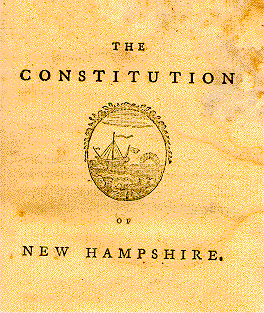Does the NH General Court (NH House, NH Senate) only serve the will of the political parties and no longer the will of the people?
In the first 4yrs (1784-1785-1786-1787) of my country, “New Hampshire,” the General Court was presented with more than 2000 petition and two remonstrances. The N.H. legislature as created by its founders, was a Court intended to hear the will of the people. And its Constitution was its delegated power and the law of the land under which its form of government was to operate.
The purpose of the General Court was defined in Part I Bill of Rights Article XXXI before it was even established in Part II form of Government.
[Art.] 31. [Meetings of Legislature, for What Purposes.] The Legislature shall assemble for the redress of public grievances and for making such laws as the public good may require.
June 2, 1784
Amended 1792 generally rewording sentence and omitting “for correcting, strengthening and confirming the laws.”
Article XXXI It has not been amended since, but unfortunately, the function of the General Court has been drastically changed, and it no longer listens to the will of the people, which they have a duty to perform. Instead it deprives the people of their rights protected by, Part I Bill of Rights Article XXXII;
[Art.] 32. [Rights of Assembly, Instruction, and Petition.] The People have a right, in an orderly and peaceable manner, to assemble and consult upon the common good, give instructions to their Representatives, and to request of the legislative body, by way of petition or remonstrance, redress of the wrongs done them, and of the grievances they suffer.
June 2, 1784
And only listens to the political parties who win the next election, which changes the form of government from the Constitutional Republic to a Democracy (mob rule).
It is time for a great awakening of the people of N.H. to rediscover their State Constitutional Rights, Privileges and immunities and take back control of the form of government from the political parties, their agents and special interest. Part I Bill of Rights Article XXXVIII;
[Art.] 38. [Social Virtues Inculcated.] A frequent recurrence to the fundamental principles of the constitution, and a constant adherence to justice, moderation, temperance, industry, frugality, and all the social virtues, are indispensably necessary to preserve the blessings of liberty and good government; the people ought, therefore, to have a particular regard to all those principles in the choice of their officers and representatives, and they have a right to require of their lawgivers and magistrates, an exact and constant observance of them, in the formation and execution of the laws necessary for the good administration of government. June 2, 1784
It is time that we start to prosecute those who violate their sworn oath of office by rights protected in our Constitutions, State and Federal. Public Official Immunity only protects public officials who have acted with a reasonable belief that they have not violated the plaintiff’s constitutional rights. Qualified immunity cannot be invoked by officials who knew that they were violating the Constitution (subjective bad faith), or who should have known that they were transgressing a clearly established constitutional rule (objective bad faith).
Your freedom of speech is much more powerful when it is in writing. Article XXXVII provides the means to file a lawful legal protest “Remonstrance” and notice of violations of the Constitutions and the oath of office of our public officials.
by Daniel Richard
